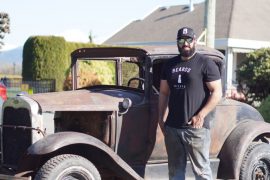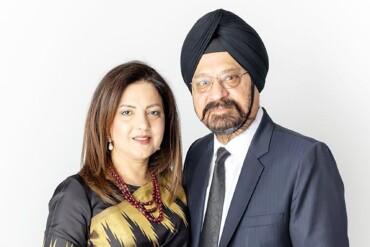BY J.M. LEE
At 18, Preet Lehal, when asked to share her story and advice, felt her experiences at this age were inadequate compared to others within the community. Being a first-generation Canadian, she has been fortunate to be surrounded by incredible mentors. Her grandmothers, who sacrificed their education for their families, and her grandfathers, who broke social norms to encourage their daughters to pursue their passions. Equally, her parents who carved their paths to success while navigating through racism as immigrants to Canada.
“Their incredible resilience and strength have greatly influenced me,” she said with pride. “So, to wrap my head around now being named a mentor in my community was a challenge. However, it has occurred to me that mentoring, leading, and inspiring—are traits that have no age limit” she explained. When reflecting on her childhood preet admitted: “I can not deny that I have had a privileged upbringing; in fact, I did not begin to realize the extent of this until my senior year of high school when I transferred to a private school. Being surrounded by opportunities, equipment, and a generally higher quality of education—which my prior public schooling had lacked—opened my eyes to the advantages I had gained due to my family’s financial status. This was when I interviewed at Options Community Services; their relentless help established the STARR Homework Club to help underprivileged students struggling in class or needing more of a challenge. These kids were incredibly kind and hardworking, and I am convinced they taught me more than I ever taught them.”

While working with the students, she was determined to make learning fun, personalized, and safe. She wanted to create a place where making mistakes was encouraged and not penalized, as there is no more extraordinary learning tool than failure. “Being an athlete for 11 years training as an artistic swimmer, I became familiar with failure and learning from mistakes,” Preet reveals. “Having a coach that made us reflect on our failures and successes after every competition, encouraged us to learn from them, and taught me the concept of a growth mindset, which was invaluable in forming my character today. Realizing that I could not only survive failure but grow from it indeed built my confidence. I began to realize that even if I failed at whatever task was ahead, I still gained a learning opportunity and a way to better myself. Having learned these lessons, I steadfastly shared them with the next generation of developing minds at STARR. Moreover, a particular challenge for me as a young athlete was not comparing myself to those around me; to this day, it remains challenging. However, in those moments of jealousy, I try to stop to reflect, ‘What good does bringing down another person’s success bring me?’ ‘What can I learn from them instead?’ This is much easier said than done in some moments, yet, I believe it is an incredible skill to acquire.”
Preet is studying neuroscience at King’s College London with the goal to become a neurosurgeon. She has two main ambitions for her future as she works on becoming a healthcare worker.
“First is to continue to expose me to varying communities to diminish any implicit biases I hold which could potentially harm my future patients,” she expounds. “I believe that a leader must accept that they hold implicit biases and be willing to work through these to prevent unintentional harm. This is one reason I am heading to Kenya this summer to intern at a hospital not located in a first-world country, as a unique and exciting challenge. The second is to take advantage of my privileges in a way that allows me to help as many people as I can”. Finally, Preet’s advice for others was that “There is no one right way to success; I want to encourage people to pursue their passions and find themselves and their unique way of leaving their impact on the world. After all, even something small, such as helping a child with their maths problem, can have lasting impacts.”






